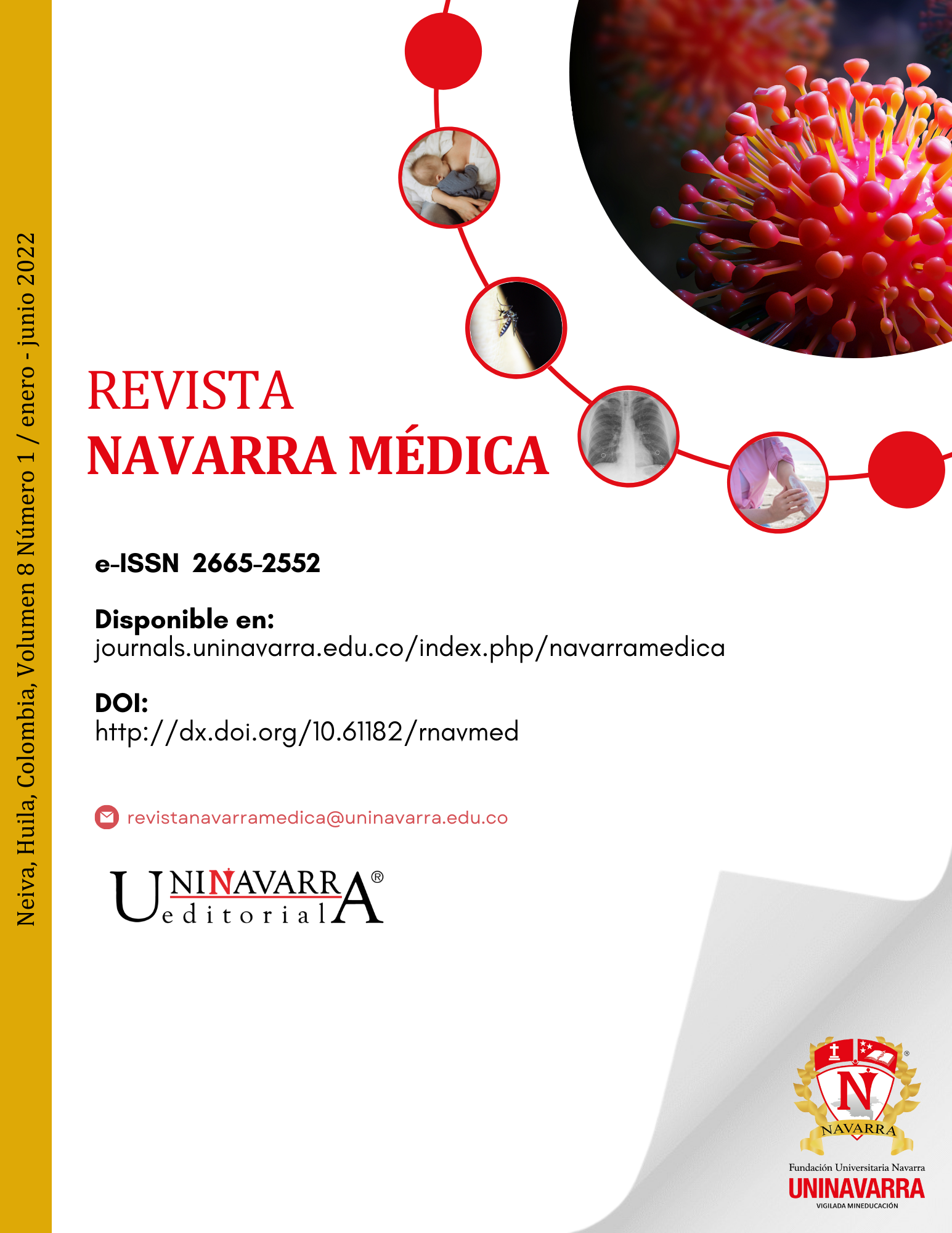Barriers and facilitators of exclusive breastfeeding duration in a first level IPS in the municipality of Palermo
DOI:
https://doi.org/10.61182/rnavmed.v8n1a1Keywords:
Barriers, Facilitators, Exclusive breastfeeding, Breastfeeding mothersAbstract
Background: The WHO recommends that infants be exclusively breastfed for the first 6 months of life. This practice protects against infections and promotes nutritional health.
Objective: To identify the barriers and facilitators of exclusive breastfeeding duration during the first 6 months of life in a primary health care facility in the municipality of Palermo.
Methods: A survey was conducted among 144 mothers of children under 6 months of age living in the urban and rural area of Palermo (Huila, Colombia), who were admitted for comprehensive assessment of the health promotion and maintenance route during the first semester of the year 2022.
Results: The possibility of practicing exclusive breastfeeding in adolescent mothers between 14 and 17 years of age was 1.58 times more than in mothers in youth or adulthood life course (p<0.01; PR=1.58 CI: 95% 0.01 - 0.53).
Conclusions: A statistically significant association was found between mothers who were knowledgeable about the benefits of breastfeeding and the practice of exclusive breastfeeding. The use of bottles or pacifiers decreases the likelihood of mothers adhering to the practice of exclusive breastfeeding (p<0.01; PR=0.074 CI: 95% 0.02 - 0.22). The provision of information by health personnel on breastfeeding increases 2-fold the likelihood of practicing exclusive breastfeeding, however, this association is not statistically significant.
References
Ministerio de la Protección Social. Por qué amamantar. [Internet]. Minsalud;2022. Disponible en: https://www.minsalud.gov.co/Paginas/Ventajas-lactancia-materna-situacion-en-el-pais.aspx
Marín Ospina J, Jiménez Urrego AM, Villamarín Betancourt EA. La importancia de la lactancia en el desarrollo físico, psíquico y relacional del niño. Vínculo. 2015; 12(1): 7–18. http://pepsic.bvsalud.org/scielo.php?script=sci_arttext&pid=S1806-24902015000100003#:~:text=La%20lactancia%20materna%20durante%20la,sobre%20diferentes%20procesos%20fisiol%C3%B3gicos%20y
Fundación Centro Internacional de Educación y Desarrollo Humano. El vínculo afectivo ¿cómo se construye? [Internet]. Cindehabla; 2022. Disponible en: https://cinde.org.co/sitio/contenidos_mo_izquierda.php?it=344#:~:text=
Ministerio de Salud y Protección Social. Importancia de la lactancia materna [Internet]. Minsalud; 2022. Available from: https://www.minsalud.gov.co/salud/publica/PI/Paginas/ImportanciaLactanciaMaterna.aspx
Fondo de las Naciones Unidas para la Infancia. Lactancia materna. La leche materna es el mejor alimento para niños y niñas durante sus primeros 6 meses de vida. 2022.
Espinola M, Sanca S, Ormeño A. Factores sociales y demográficos asociados a la anemia en mujeres embarazada en Perú. Rev Chil Obstet Ginecol [Internet]. 2021;86(2):192–201. Disponible en: https://www.scielo.cl/scielo.php?script=sci_arttext&pid=S0717-75262021000200192#:~:text=
Ramiro González MD, Ortiz Marrón H, Arana Cañedo-Argüelles C, Esparza Olcina MJ, Cortés Rico O, Terol Claramonte M, et al. Prevalence of breastfeeding and factors associated with the start and duration of exclusive breastfeeding in the Community of Madrid among participants in the ELOIN. An Pediatr. 2018;89(1):32–43. DOI: 10.1016/j.anpedi.2017.09.002.
Barboza Solano A, Morales Villa S. Conocimiento y práctica de lactancia materna exclusiva en madres de niños menores de 6 meses que acuden al centro de salud condorillo, Chincha – 2021. Repos la UAI [Internet]. 2021; Available from: http://repositorio.autonomadeica.edu.pe/bitstream/autonomadeica/1124/1/BARBOZA-MORALES.pdf%0Ahttp://repositorio.autonomadeica.edu.pe/handle/autonomadeica/1124
Organización Panamericana de la Salud. Lactancia materna y alimentación complementaria. Semana de la lactancia materna [Internet]. 2022. Disponible en: https://www.paho.org/es/campanas/semana-lactancia-materna-2022-impulsemos-lactancia-materna#:~:text=1%2D7%20DE%20AGOSTO%20DE,Lactancia%20Materna%3A%20Apoyando%20y%20Educando
Medela. Por qué el calostro es tan importante [Internet]. Medela;2022. Disponible en: https://www.medela.es/lactancia/viaje-de-las-madres/calostro
Brahm P, Valdés V. Beneficios de la lactancia materna y riesgos de no amamantar. Rev Chil Pediatr. 2017;88(1): 07-14. http://dx.doi.org/10.4067/S0370-41062017000100001
Pinilla Gómez E, Orozco LC, Camargo Figuera FA, Alfonso HEP, Peña V. ER, Villabona A. LN, et al. Ineffective Breastfeeding: prevalence and associated factors. Rev Salud Uis [Internet]. 2011;43(3):271–9. Disponible en: http://dialnet.unirioja.es/servlet/articulo?codigo=3961243&info=resumen&idioma=SPA
Biblioteca Nacional de Medicina. Fórmulas para lactantes [Internet]. Información de salud para usted. 2022. Disponible en: https://medlineplus.gov/spanish/ency/article/002447.htm#:~:text=
Schellhorn C, Valdés V, Achurra X, Alvear J, Atalah E. Manual de Lactancia Materna Ministerio de Salud [Internet]. Ministerio de Salud. 2018. 238–289 p. Disponible en: https://www.minsal.cl/sites/default/files/files/manual_lactancia_materna.pdf
Vargas-Zarate M, Becerra-Bulla F, Yineth Balsero-Oyuela S, Meneses-Burbano YS. Breastfeeding: Myths and truths. Review article. Rev Fac Med. 2020;68(4):608–16.
Anzola M, Peña-Rosas JP. Metas globales de la Organización Mundial de la Salud para mejorar la nutrición materna, del lactante y del niño pequeño. An Venez Nutr. 2014;27(1):26–30.
Organización Panamericana de la Salud. Estrategia Mundial para la alimentación del lactante y del niño pequeño [Internet]. 2022. Available from: https://www.paho.org/es/documentos/estrategia-mundial-para-alimentacion-lactante-nino-pequeno-1
Asociación Española de Pediatría. Técnicas de lactancia materna [Internet]. Comité de lactancia materna. 2022. Disponible en: http://lactanciamaterna.aeped.es/tecnicas-de-lactancia-materna/
Pino Villalón JL, López E. MÁ, Medel I. AP, Ortega S. A. Factors affecting the duration of exclusiv breastfeeding in a rural community of Chile. Rev Chil Nutr. 2013;40(1) 48-54. http://dx.doi.org/10.4067/S0717-75182013000100008
Sámano R, Chico G, Armenteros T, Escamilla N, Piélago C, Aguilar J, et al. Barreras y facilitadores para la práctica de lactancia materna exclusiva en un grupo de madres de la ciudad de México. Arch latinoam nutr. 2018;68(1):41–50. https://doi.org/10.37527/2018.68.1.004
Fernández-Vegue MG. Recomendaciones de la Asociación Española de Pediatría sobre la alimentación complementaria. AEPED; 2018. https://www.aeped.es/sites/default/files/documentos/recomendaciones_aep_sobre_alimentacio_n_complementaria_nov2018_v3_final.pdf
Downloads
Published
Issue
Section
License
Copyright (c) 2022 Ruby Lorena Molina Lasso, Laura Viviana Esteban Castellanos

This work is licensed under a Creative Commons Attribution-NonCommercial 4.0 International License.












